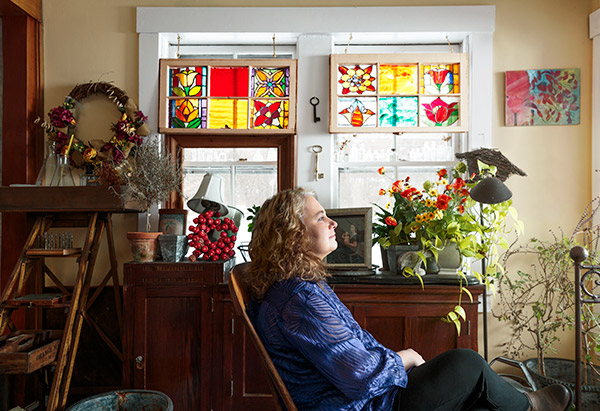Getting Lighter: The Transformative Power of a Little Sprucing Up

Photo: Chris Crisman
Over decades of crushing depression, Lauren Slater had let certain of life's luxuries—like clean clothes and regular showers—fall away. But when her unkemptness grew bad enough to land her in the hospital, she took a radical step: She bought a few new outfits, went to the salon, and learned how deeply transformative a little sprucing up can be.
My depression has been with me for so long now, I know it like a friend. And like a friend, I can remember the day we met, when I was only 5—bright white with summer heat, the roses burning on their bushes, the whole world suddenly flattening out, and colors draining from their forms, leaving behind etched outlines of things that before had been vibrant. I don't have a why, a pinpoint, a reason. I only know that as time went by and I grew up, so did my depression, moving around in my body, making lead of my legs, filling my head with fog. Now, as I near 50—face lined, body carrying many more pounds than it should—my depression, it seems, inhabits my heart and, despite my considerable bulk, takes the shape of a slim speckled stone worn smooth by my body's currents, its contours changing over time while its essence stays the same. My depression does magic. Poof! Each day it disappears at around 4 or 4:30 in the afternoon and then—slam!—returns at dawn, sapping my energy, stealing color from trees and leaves and socks and spoons, everything still and silent as if under some spell.
I'm not complaining, or if I am I don't mean to be. Thanks to antidepressants I reliably have seven hours, more or less, of good clear time, and I strive to use it well, ticking off items on my to-do list, trying to tie up my business so that when the fog comes, at least things will be in order. Still, seven waking hours is not a lot, less than half the 16 or so most people have. Last year I bought a large clock that I hung in the hub of our house—the kitchen—right where I can hear it best. My kids complain about the hourly clang, the audible ticks, the absurd (in their opinion) clock face made from an "upcycled" trash can cover, but I've come to count on the constant reminder of my dilemma and its demands.
Given my daily timetable, it should come as no surprise that much in my life falls by the wayside. My taxes, for instance, are always late. My children's doctor and dentist appointments are missed, rescheduled, missed again. I shop for their clothes flying through Target as fast as I can, ripping from the racks the pants and skirts that society demands they wear. For many years my own wardrobe was not nearly as nice; on a typical day the best I could do was a pair of pajama pants, the elastic gone loose at the waist, and a gray shirt stained with various seepages and spills. My hair was two-tone: the bottom an anemic yellow, the roots wiry white. On the windowsill in the bathroom sat a box of dye, on its front a woman with hair seal-smooth and swinging. I kept meaning to color my hair, but I never found the time. I could not indulge in frippery and frills, in long soaks in a tub full of bubbles or beads.
The truth of the matter is, I was a schlump, a frump, my clothes secondhand and utterly without style, dirt under my fingernails, the nails themselves without shape, their excess hacked off every few months, making my already stubby fingers look still more so. I'd never had a pedicure and couldn't see why I ever would, what with only seven productive hours to my day. My husband, who is himself a bit of a slob, was nevertheless somewhat sobered by my lack of grooming and tried, on occasion, to motivate me with gifts that did me not much good: petite bottles of perfume I never used or earrings in a box tied up with red ribbon. His offerings were shy and hesitant, at odds, he felt, with his feminist leanings but speaking to some deeper desire within him: to have a wife who looked, if not good, at least good enough.
The story I'm telling here is in part a confession, a way of coming metaphorically clean—to make up for the fact, perhaps, that in real life, for so long, I rarely had the time or energy to shower. Because of this, some months ago I developed an abscess at the base of my spine, where the coccyx is. At first I thought I'd bruised the bone, but as weeks went by the pain only increased, and when I reached my hand around I felt a hot hard lump weeping fluid. My physician told me I had what is called a pilonidal cyst—a bad one and an infected one to boot. The next day, I lay on my belly on a surgeon's steel table as the cyst was drained, a procedure so painful it lies beyond language, the surgeon, employing no anesthetic beyond a useless slug of Novocain, slicing into the boil and then squeezing its contents so hard I heard the spurt and saw, smeared on a large white cloth, blood and pus and a shocking amount of green goo, the smell fetid and wrong. The surgeon stuffed gauze and a wick into the wound and told me to keep myself clean and come back in two weeks to have the wick removed. On the way out he handed me a prescription for OxyContin, which I immediately filled and took four of, even though the label capped the dose at two. I lay on my bed and watched the air eddy and swirl.
Next: The experiment that changed everything



